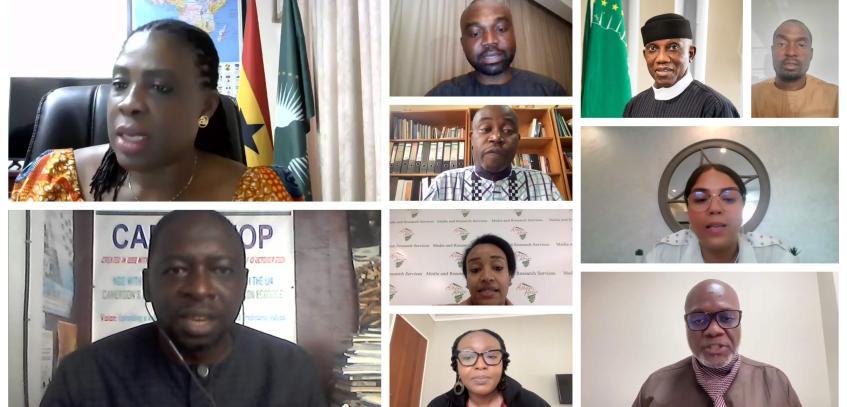The Economic Social and Cultural Council (ECOSOCC), in its capacity as the Civil Society Organ of the African Union (AU), today virtually facilitated the inaugural annual consultation between African Civil Society Organizations (CSOs) and the Peace and Security Council (PSC) of the AU on the implementation of the AU’s peace and security formulas and declarations.
Article 20 of the protocol relating to the establishment of the PSC Protocol, encourages non-governmental organizations, community-based organizations, and other civil society organizations to participate actively in the efforts aimed at promoting peace, security, and stability in Africa.
To effect Article 20 of the PSC Protocol, the PSC at its retreat in July 2007, decided that an appropriate formula should be developed and approved by the PSC, allowing for the interaction between the PSC and CSOs. Subsequently, a CSO Forum and a PSC Retreat were organized in Lusaka and Livingstone respectively, to formulate an appropriate mechanism for interaction between the PSC and CSOs. The outcome of the retreat was what is known as the Livingstone Formula.
In February 2014, the PSC held a retreat with CSOs to review progress, challenges, and opportunities in the implementation of the Livingstone Formula. The retreat adopted the Maseru Conclusions on enhancing the implementation of the Livingstone Formula for interaction between the PSC and CSOs in the promotion of peace, security, and stability in Africa.
The Livingstone Formula and the Maseru Conclusions call for periodic structured engagements between the PSC and CSOs in Africa.
Today’s inaugural meeting focused on Unconstitutional Changes of Government and terrorism and identified and clarified the role of African civil society in the implementation and monitoring of the outcomes of various continental dialogues that have taken place on the subject, including the Reflection Forum on Unconstitutional Changes of Government, that was held in Accra in March 2022; the AU Extraordinary Summit on Terrorism and Unconstitutional Changes of Government, held in Malabo in May 2022, and the ECOSOCC Citizens’ Forum on Democracy and Unconstitutional Changes of Government, held in Lusaka in July 2022.
Today’s meeting featured five CSOs, representing the five regions of Africa, and working in the field of governance, democracy peace and security, namely: the Pan African Lawyers Union (PALU), representing Eastern Africa; West African Civil Society Institute (WASCI), representing Western Africa; Cameroon Youths and Students Forum for Peace, representing Central Africa; Southern Africa Partnerships for Prevention of Conflicts (SAPPC), representing Southern Africa; and the Association International Cle de la Paix Pour le Developpement et la Solidarite, representing Northern Africa.
Opening the meeting, H.E. Ambassador Amma Twum-Amoah, Permanent Representative of the Republic of Ghana to the AU and PSC Chairperson for the month of September 2022; underscored the significant role that civil society plays in promoting good governance in Africa. She urged the CSOs to engage robustly with the PSC in order to enhance efforts aimed at promoting peace, security, and stability in Africa.
AUC Commissioner for Political Affairs, Peace and Security (PAPS), H.E. Ambassador Bankole Adeoye, also stressed the importance of an active civil society to the implementation of AU programs.
“The Livingstone Formula and the Maseru Conclusions reinforce the necessity of periodic structured engagements between the PSC and CSOs,” he said.
ECOSOCC’s Head of Programmes, Mr. Kyeretwie Osei, gave an overview of how ECOSOCC is working to engage CSO’s through interventions like the establishment of a CSO continental database to interface with the PSC and the AU PAPS; scaling up advocacy on PSC programs and initiatives; mobilizing CSOs to support continental initiatives, particularly UCGs in Africa; working with CSOs in the development of a policy booklet on 2021 AU Theme of the Year to achieve peace and security on the continent and integrating youth and women throughout Africa’s peace and security architecture.
Mr. Donald Deya, Chief Executive Officer of Pan African Lawyers Union (PALU) (Eastern Africa Region); Mr. Nqobile Moyo, Executive Director, Southern Africa Partnerships for Prevention of Conflict –SAPPC (Southern Africa Region); Ms. Nana Asantewaa Afadzinu, West Africa Civil Society Institute (WASCI) (Western Africa region); Mr. Eugene Ngalime, Cameroon Youths and Students Forum for Peace and former Chairperson of the ECOSOCC peace and security cluster (Central Africa Region) and Ms. Meriam El Bedad, Head of Peace and Security Working Group, Association Internationale Cle de la Paix pour le developpement et la solidarite (Northern Africa Region) gave presentations of regional perspectives on governance, peace and security issues. (The presentations are available in speech section below).
The meeting ended with the issuance of a communique that outlined actionable strategies on how the PSC could engage African CSOs to present a common work plan to support the work of the PSC on the implementation of both the Accra and Malabo outcome documents.





